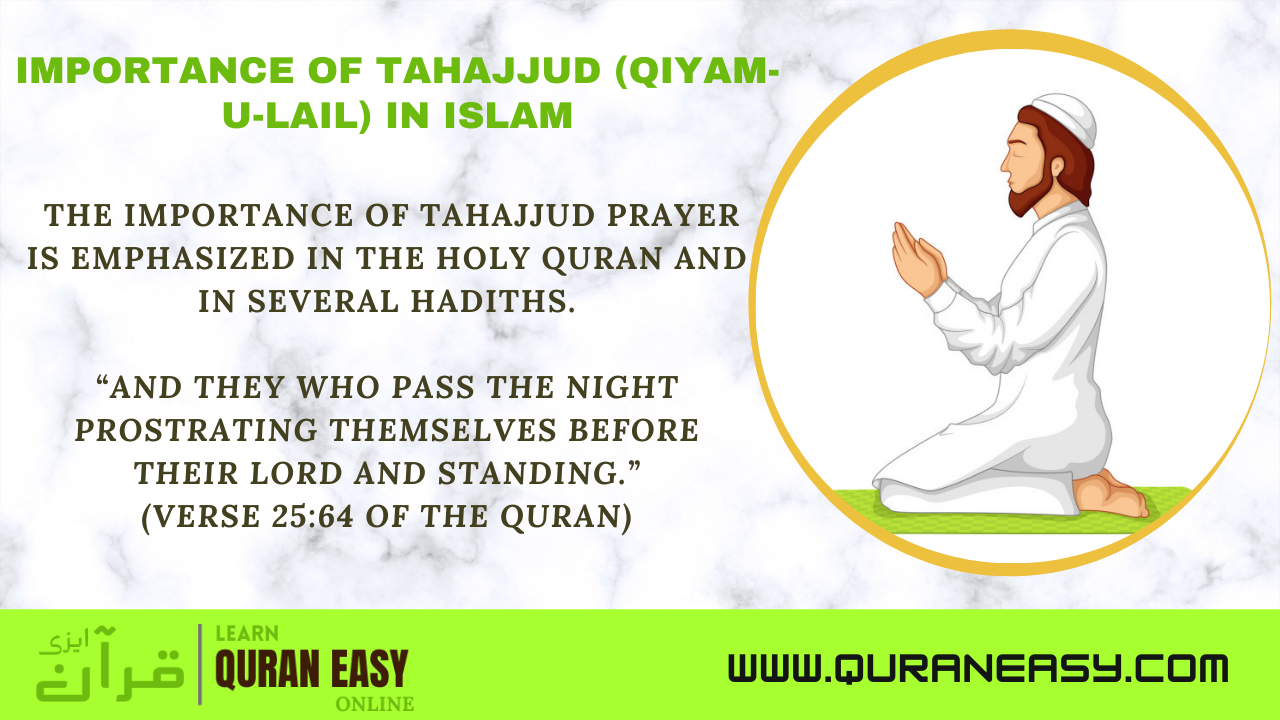Tahajjud prayer is also termed as Qiyam-u-lail. Participation in the Tahajjud is encouraged (but not required) for all Muslims to participate in this special Islamic prayer. After Isha (the obligatory nightly prayer) and before Fajr (the obligatory Morning Prayer), the Tahajjud is prayed. If at all possible, perform Tahajjud between the hours of midnight and Fajr, preferably in the last third of the night. Though the Tahajjud is not obligatory, many devout Muslims try to incorporate it into their daily lives as a form of worship and earn Allah’s forgiveness and redemption.
Rakats of Tahajjud
Two Rakats is generally considered the bare minimum for a proper Tahajjud. Though, you can repeat as many times as you want. According to Hadiths, the Prophet Muhammad prayed up to thirteen rakats regularly. Tahajjud rakats are performed in pairs, and many Muslims consider eight rakats to be a sufficient number. The vast majority of scholars vote in favor of two, four, six, or eight rakats, though more is not forbidden.
Method to perform tahajjud prayer
Tahajjud prayer is done in the same way that obligatory prayers are.
- First, make the Niyyah (intention) by reciting, “I intend to perform two rakats of salat al Tahajjud,” and then, in the first rakkat, say the takbir “Allahu Akbar.” This is the point at which the prayer begins. Begin with “Subhanaka.”
- After saying: “Audhubillahi Min-ash-shaytanir-rajeem then Bismillah-ir-Rahman-ir-raheem”
- Begin by reciting Surah Al-Fatiha, then another Surah from the Qur’an.
- After that, bow in Ruku and say, “SubahaanaRabbiyal Azeem.”
- After that, we enter the first Sajdah and say, “SubahaanaRabbiyalAa’la.”
- We then rise from the first Sajdah in jalsa position (between the two Sajdah) and enter the second Sajdah, saying, “SubahaanaRabbiyalAa’la.”
- As we rise to begin the second raka’at, we repeat the process from the first, then we say “SubahaanaRabbiyalAa’la” after the second Sajdah.
- After that, you sit for the entire Tashshahud, including At-tahiyyat, Drood-e-Ibrahimi, and Rabbana.
- Begin by turning to your right and saying “Assalamualaikum waRahmatullah,” then turn to your left and repeat.
Benefits and importance of tahajjud in the light of Quran and Hadiths:
This blessed prayer brings a Muslim closer to the Almighty and brings peace and brightness into his or her life. The importance of Tahajjud prayer is emphasized in the Holy Quran and in several Hadiths. Allah says in the Holy Quran:
“And they who pass the night prostrating themselves before their Lord and standing.”
(Verse 25:64 of the Quran)
The Holy Quran also mentions that those who devote time to Tahajjud prayer achieve great benefits.
“And He will provide him from (sources) he never could imagine. And whosoever puts his trust in Allah, then He will suffice him. Verily, Allah will accomplish his purpose. Indeed Allah has set a measure for all things.”
(Surah Talaq Ch 65, V3)
According to Islam, during the night when tahajjud is performed, Allah descends to the lowest heaven to see who is devotedly worshipping and waking up in the middle of the night. Then, in another place, Allah said:
“And from [part of] the night, pray with it as additional [worship] for you; it is expected that your Lord will resurrect you to a praised station.”
(Quran, 17: 79)
It is also claimed that the Tahajjud prayer bestows patience when faced with difficulties. Tahajjud is known to bring peace to the distressed heart when practiced daily.
“And the servants of the Most Merciful [Allah] are those who walk upon the earth easily, and when the ignorant address them [harshly], they say [words of] peace, and devote [part of] the night to their Lord prostrating and standing [in prayer].”
(Quran 25:63-64)
Tahajjud prayer is one of the most beneficial non-obligatory prayers because it is the source of Allah’s great blessings and mercy. Hadith states that:
‘Every night, when one-third of the night remains, the Lord descends to the lowest heaven and says, ‘Who will call upon Me, that I may answer Him?’ Who will ask Me for something, and I will give it to him? Who will come to Me and ask for forgiveness, so that I may forgive him?”
(Bukhari, Muslim)
Tahajjud prayer is also regarded as the best of the voluntary prayers; one significant benefit of performing Tahajjud is that it aids in the resolution of daily problems. When performing this prayer, one abandons all worldly concerns and completely trusts Allah. When a believer surrenders his or her entire life to the Almighty, the supreme power assists with various channels. Allah’s Messenger commanded us to pray at night, whether it was a little or a lot. According to the Prophet (PBUH),
“Every night, there is a time during the night when the Muslim does not ask for the sake of this world’s or the Afterlife’s good, but it is given to him.”
Tahajjud prayer is beneficial because it provides inner strength and mental peace. It is also capable of preventing sin and wickedness from occurring. Furthermore, according to Islamic tradition, the third part of the night is the best time to make wishes/duas. Prophet Muhammad (PBUH) stated:
“The Lord is closest to His slave in the late hours of the night, so It would be wonderful if you could be among those who remember Allah. at that time, do so.”
(Al-Tirmidhi and al-Nisaa’i)
“Which late-night prayer is the most effective?” Abu Muslim enquired about abuZar. “I asked Allah’s Messenger the same question you did, and he said,
“It’s done in the middle of the night by a small number of people.”
Duas of tahajjud:
Abdullah Ibn ‘Abbas (RA) narrates;
l heard Muhammad (PBUH) reciting these Duas at night after he had completed his Tahajjud salat:





Leave A Comment